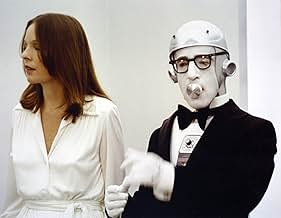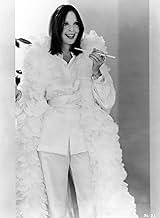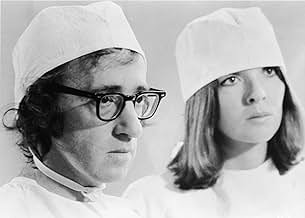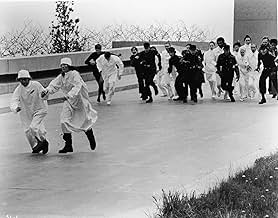IMDb RATING
7.1/10
46K
YOUR RATING
A nerdish store owner is revived out of cryostasis into a future world to fight an oppressive government.A nerdish store owner is revived out of cryostasis into a future world to fight an oppressive government.A nerdish store owner is revived out of cryostasis into a future world to fight an oppressive government.
- Awards
- 2 wins & 2 nominations total
Mews Small
- Dr. Nero
- (as Marya Small)
Stanley Ralph Ross
- Sears Swiggles
- (as Stanley Ross)
John Cannon
- Various Voice-Overs
- (voice)
- (uncredited)
Myron Cohen
- Robot Tailor
- (uncredited)
- Director
- Writers
- All cast & crew
- Production, box office & more at IMDbPro
Featured reviews
Miles Monroe (director Allen), a health food store owner and jazz clarinetist, goes to a hospital for a routine operation, but something goes wrong and he is put to cryogenic sleep for over 200 years. When he is woken up in the 22nd century, the society has changed into a pleasure-addicted dictatorship. Miles is immediately pulled into revolutionary activity and soon has to flee the state police on his way to the mysterious ruler of the society. He also finds himself teaming up with an initially reluctant woman called Luna (Diane Keaton) and together they adventure through the futuristic society.
The comedic style of Sleeper is an entertaining combination of over-the-top farce and Allen's usual verbal jabs at the society of the 20th century. The silly jazz music accompanying the bumbling chase scenes evokes memories from the silent era (some scenes are even sped-up), and the old masters of slapstick have clearly been a major influence to the style. There are also many references to more modern works of science fiction, such as 2001: A Space Odyssey and Nineteen Eight-Four. Besides the funny farcical scenes, Allen gets to perform his classic neurotic worrying routine that works fine and will amuse fans of his on-screen persona.
A very notable aspect of the film is its visual style: the sets and props all look excellent. The futuristic houses, round vehicles, stiff servant robots, gigantic fruits and even an unruly pudding look hilarious and the many details of the society provide chances to comment on how things are advancing in our times. Be it an orgasm-machine or nonsensical poetry, they seem to suggest we are moving towards times where ignorance revels and empty pleasure-hunting is celebrated as the only correct form of bliss; it can be said that the underlying themes of Sleeper are not unlike those of Aldous Huxley's classic novel Brave New World.
Social commentary aside, Sleeper is also a very funny comedy that appeals not only to friends of Allen's neurotic shtick but also to slapstick fans and admirers of creative production design. Diane Keaton also deserves praise for her performance that features all the necessary comical energy and makes a good pairing for the protagonist Miles. In brief, I laughed out loud several times and would rank the film highly among the handful of Allen films I've seen so far. As far as sci-fi comedies go, Sleeper is a definite winner.
The comedic style of Sleeper is an entertaining combination of over-the-top farce and Allen's usual verbal jabs at the society of the 20th century. The silly jazz music accompanying the bumbling chase scenes evokes memories from the silent era (some scenes are even sped-up), and the old masters of slapstick have clearly been a major influence to the style. There are also many references to more modern works of science fiction, such as 2001: A Space Odyssey and Nineteen Eight-Four. Besides the funny farcical scenes, Allen gets to perform his classic neurotic worrying routine that works fine and will amuse fans of his on-screen persona.
A very notable aspect of the film is its visual style: the sets and props all look excellent. The futuristic houses, round vehicles, stiff servant robots, gigantic fruits and even an unruly pudding look hilarious and the many details of the society provide chances to comment on how things are advancing in our times. Be it an orgasm-machine or nonsensical poetry, they seem to suggest we are moving towards times where ignorance revels and empty pleasure-hunting is celebrated as the only correct form of bliss; it can be said that the underlying themes of Sleeper are not unlike those of Aldous Huxley's classic novel Brave New World.
Social commentary aside, Sleeper is also a very funny comedy that appeals not only to friends of Allen's neurotic shtick but also to slapstick fans and admirers of creative production design. Diane Keaton also deserves praise for her performance that features all the necessary comical energy and makes a good pairing for the protagonist Miles. In brief, I laughed out loud several times and would rank the film highly among the handful of Allen films I've seen so far. As far as sci-fi comedies go, Sleeper is a definite winner.
No question that Woody Allen's earliest films were the most unpretentiously humorous, and Sleeper stands out among them. The conception of a frozen Allen waking up centuries in the future allows for plenty of biting satire on America in the 70's, not that we don't have plenty of good old-fashioned slapstick to boot. The bit with the Jewish robot tailors knocks me out no matter how many times I see it ("o-KAY, ve'll take it IN").
I think I am going to have to rank this as Woody Allen's second-best (and second-funniest) movie... after the unbeatable "Annie Hall". Even after having seen the movie 3 or 4 times I still find myself amused by some of Allen's shtick... and his rarely-demonstrated adeptness at physical comedy. So many classic physical bits: riding around in the wheelchair... eating the rubber glove... the future scientists trying to force his slack body into a futuristic vehicle. After this movie Woody started to get a little too cerebral... this was his last attempt at a just-plain-funny movie... and probably his most satisfying of his early comedies... only because there was a sort-of storyline. Woody is cryogenically frozen after a botched operation in the 1970s and is awoken 200 years later to find himself in a repressive Orwellian future. He meets up with a spoiled rich chick (Diane Keaton) and influences her (not really intentionally) into becoming a revolutionary activist.
We are blessed that Woody was around, making movies as interesting as this when he was.
Already with this one, he began his vast exploration of movie techniques and devices that would last 25 years or so.
The idea is simple in this one: he wanted to use film slapstick from a bygone era. How better to situate that than to move the whole picture into a future era?
We have some truly classic stuff here. The banana joke, The mirror joke. The robot pantomime. The acting out of the Jewish dinner (done in later movies too). The inflated man joke. You can find all these in any number of Keaton. Marx, Laurel & Hardy movies.
The unifying string of time travel, a romance, the leader and his nose is too weak to make this a solidly recommended outing. And it wouldn't be for a couple years until Woody cared about the cinematography at all.
I had forgotten how pretty Diane Keaton was. Very.
Ted's Evaluation -- 2 of 3: Has some interesting elements.
Already with this one, he began his vast exploration of movie techniques and devices that would last 25 years or so.
The idea is simple in this one: he wanted to use film slapstick from a bygone era. How better to situate that than to move the whole picture into a future era?
We have some truly classic stuff here. The banana joke, The mirror joke. The robot pantomime. The acting out of the Jewish dinner (done in later movies too). The inflated man joke. You can find all these in any number of Keaton. Marx, Laurel & Hardy movies.
The unifying string of time travel, a romance, the leader and his nose is too weak to make this a solidly recommended outing. And it wouldn't be for a couple years until Woody cared about the cinematography at all.
I had forgotten how pretty Diane Keaton was. Very.
Ted's Evaluation -- 2 of 3: Has some interesting elements.
Before he became a "serious" filmmaker and gained the respect and admiration of film critics, Woody Allen was already entertaining millions of fans with such unashamedly silly comedies as 1973's 'Sleeper.' The science-fiction story concerns an unfortunate Miles Monroe (Allen), the 1970s owner of the Happy Carrot health-food store, who goes into St. Vincent's Hospital for a routine peptic ulcer operation and wakes up 200 years later in a terrifying police state. He is revived by a subversive underground rebel organisation to help uncover the secrets of the dreaded "Aries Project," and to overthrow the tyrannical government and its dictator. Along the way, Miles enlists the help of the neurotic and exuberant Luna Schlosser (Diane Keaton, who collaborated with Allen on multiple occasions, most notably in 'Annie Hall (1977)' and 'Manhattan (1979)').
A chaotic blend of razor-sharp satire and slapstick humour, 'Sleeper' contains enough of Allen's and co-writer Marshall Brickmann's trademark wit to remind us of what makes their later collaborations so brilliant. Of course, as Allen had yet to reach his creative peak, some of the jokes in the film work (the infamous Orgasmatron; the Volkswagen Beetle that starts up immediately after 200 years of neglect), whilst others aren't pulled off quite so well (the giant chicken; the mock Miss America pageant). In one memorable sequence, year 2173 historians show Miles a collection of historical items and photographs, and he idly gives off ridiculous explanations which they accept as fact. For example, yes, Howard Cosell's sporting reports were used as punishment for criminals who had committed a crime against the state!
The promotional posters for the film proclaimed: "Woody Allen Takes A Nostalgic Look At The Future." This, more than likely, refers to the style of comedy, which, aside from Allen's witty observations, very much evokes memories of the silent slapstick comedies of Lloyd, Keaton and Chaplin. Much like the latter did with most of his films, Allen wrote, directed, starred in and composed the score for 'Sleeper.' The score itself, which is very upbeat, New Orleans-style traditional jazz, was performed by the Preservation Hall Jazz Band with Allen sitting in on clarinet. 'Sleeper' may have been inspired by H.G. Wells' classic novel, 'The Sleeper Awakes,' which recounts the tale of a man who awakes from a 203-year sleep to find himself in a horrifyingly-transformed futuristic London.
Aside from including a wealth of instantly-quotable one-liners ("I'm not really the heroic type. I was beat up by Quakers"), Allen also has a lot of fun in his disorganised futuristic dystopia. After pouring too much "Instant Pudding" into a bowl, the overdone dessert practically comes to life and has to be beaten into submission with a broom; it is also revealed that, contrary to popular agreement in 1973, such substances as deep fat, tobacco and hot fudge are not only not unhealthy, but probably the best thing for your body! When Miles happens upon a garden of human-size fruit and vegetables, we just know that the giant banana peel is going to come into play somewhere, and, sure enough, Miles inevitably takes a tumble.
A chaotic blend of razor-sharp satire and slapstick humour, 'Sleeper' contains enough of Allen's and co-writer Marshall Brickmann's trademark wit to remind us of what makes their later collaborations so brilliant. Of course, as Allen had yet to reach his creative peak, some of the jokes in the film work (the infamous Orgasmatron; the Volkswagen Beetle that starts up immediately after 200 years of neglect), whilst others aren't pulled off quite so well (the giant chicken; the mock Miss America pageant). In one memorable sequence, year 2173 historians show Miles a collection of historical items and photographs, and he idly gives off ridiculous explanations which they accept as fact. For example, yes, Howard Cosell's sporting reports were used as punishment for criminals who had committed a crime against the state!
The promotional posters for the film proclaimed: "Woody Allen Takes A Nostalgic Look At The Future." This, more than likely, refers to the style of comedy, which, aside from Allen's witty observations, very much evokes memories of the silent slapstick comedies of Lloyd, Keaton and Chaplin. Much like the latter did with most of his films, Allen wrote, directed, starred in and composed the score for 'Sleeper.' The score itself, which is very upbeat, New Orleans-style traditional jazz, was performed by the Preservation Hall Jazz Band with Allen sitting in on clarinet. 'Sleeper' may have been inspired by H.G. Wells' classic novel, 'The Sleeper Awakes,' which recounts the tale of a man who awakes from a 203-year sleep to find himself in a horrifyingly-transformed futuristic London.
Aside from including a wealth of instantly-quotable one-liners ("I'm not really the heroic type. I was beat up by Quakers"), Allen also has a lot of fun in his disorganised futuristic dystopia. After pouring too much "Instant Pudding" into a bowl, the overdone dessert practically comes to life and has to be beaten into submission with a broom; it is also revealed that, contrary to popular agreement in 1973, such substances as deep fat, tobacco and hot fudge are not only not unhealthy, but probably the best thing for your body! When Miles happens upon a garden of human-size fruit and vegetables, we just know that the giant banana peel is going to come into play somewhere, and, sure enough, Miles inevitably takes a tumble.
Did you know
- TriviaWoody Allen originally intended the film to be three hours long and in two parts. The first part would have him in the present day, coping with life until his illness. And the second half would be the futuristic part. But United Artists rejected this concept.
- GoofsLuna's shoes change from high heels to flats when she crosses the lake on Miles' back (in the "raft" costume).
- Quotes
Luna Schlosser: It's hard to believe that you haven't had sex for 200 years.
Miles Monroe: 204, if you count my marriage.
- ConnectionsEdited into Intimate Portrait: Diane Keaton (2001)
- SoundtracksTill We Meet Again
(1918) (uncredited)
Music by Richard A. Whiting
Lyrics by Ray Egan
Performed by Woody Allen
- How long is Sleeper?Powered by Alexa
Details
- Release date
- Country of origin
- Languages
- Also known as
- El dormilón
- Filming locations
- Sculptured House - 24501 Ski Hill Drive, Golden, Colorado, USA(mushroom shaped building, top of mountain on south side of I-70)
- Production companies
- See more company credits at IMDbPro
Box office
- Budget
- $2,000,000 (estimated)
- Gross US & Canada
- $18,344,729
- Gross worldwide
- $18,344,868
Contribute to this page
Suggest an edit or add missing content


































